Institute for the Internationalization of LawRSS
Welcome to the IIR!
The Institute for the Internationalization of Law focuses on the increasing internationalization of law on both horizontal and vertical levels.
Thus, it is dedicated to European and International law (the horizontal level) and the mutual influence of constitutional orders (the vertical level).
International law research focuses on the law of international treaties, the role of international courts, the law of international organizations, and potential autocratic developments in international law.
Research in European law is centered around the relationship between European Union law and constitutional law, questions of constitutional identity, and the interpretive methods of the European Court of Justice.
The area of vertical internationalization concerns the vertical connections between various legal systems, which are examined through constitutional comparison and/or the adoption of foreign regulatory ideas. The aim is to highlight how constitutional orders communicate with each other through imitation, creativity, and comparison, and how constitutional ideas migrate across space and time.
News:
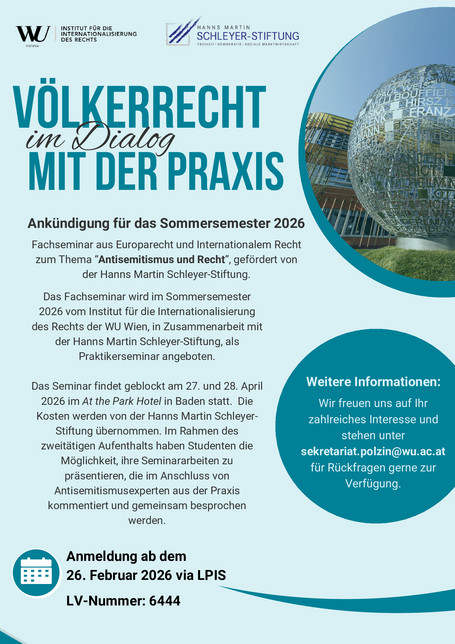
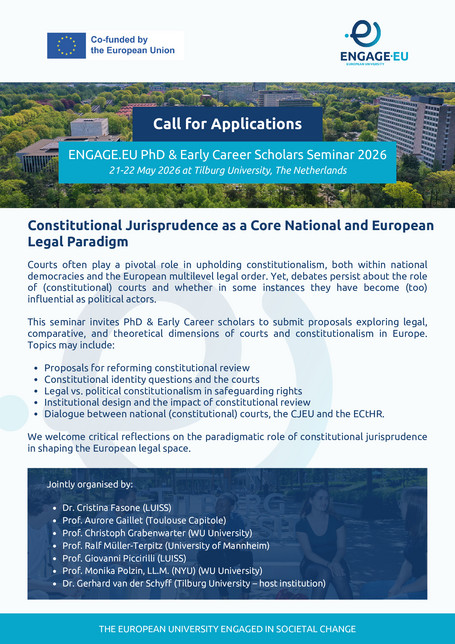
Call for Applications: Constitutional Jurisprudence as a Core National and European Legal Paradigm – 1 February 2026
Please refer to the link for detailed information.
Successful Academic Promotion
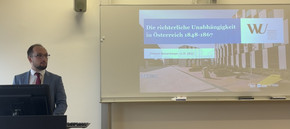
The IIR congratulates Dr. Clemens Beckenberger on his successfully defended dissertation on the topic of “Judicial Independence in Austria from 1848 to 1867” on November 12.
The dissertation examined the legal history of judicial independence, focusing in particular on its representation and development.
A look back, a mission forward
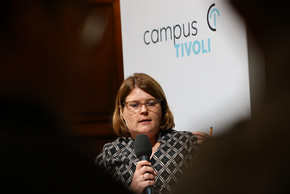
On November 9, 2025, the Head of the Institute Univ-Prof. Dr. Monika Polzin, LL.M. (NYU) took part in an event commemorating the November pogroms in 1938. During the discussion, she criticized, among other things, the false accusation of genocide against Israel. [To the report ]
Who is allowed to interpret the European Convention on Human Rights?
On June 16, 2025, a guest contribution by Professor Monika Polzin, LL.M. (NYU) regarding the open letter from nine ECHR member states on the interpretation of the European Convention on Human Rights appeared in the newspaper 'DiePresse', in the Legal Panorama section. The contribution titled 'Human Rights: States Can Curb Activist Judges' can be found here.
On July 21, 2025, this contribution was published in a slightly revised version in the Danish newspaper Information: The link can be found here.
Lecture at the Annual Conference of the German Association for International Law
On July 11, 2025, Prof. Dr. Monika Polzin, LL.M. (NYU) gave a lecture on the topic: 'International Law as Autocratic Law?' at the annual conference of the German Association for International Law in Frankfurt.
Who is allowed to interpret the European Convention on Human Rights?
On June 16, 2025, a guest article by Prof. Monika Polzin, LL.M. (NYU) was published in the newspaper "DiePresse", in the section Legal Panorama, regarding the open letter from nine ECHR member states on the interpretation of the European Convention on Human Rights. The article titled "Human Rights: States Can Curb Activist Judges" can be found here
The ICJ and the Genocide Accusation Against Israel
On June 7, 2025, Univ.-Prof. Monika Polzin, LL.M. (NYU) published an article titled: 'Genocide Accusation Against Israel: The ICJ and International Law' on mena-watch. You can find the link to the article, which is based on a longer academic paper that will soon be published in the Israel Law Review, here
Legal Panorama with Univ.-Prof. Monika Polzin – “Putin, Trump & Co.: The Decline of International Law”
On March 17, Monika Polzin took part as an expert in the Legal Panorama hosted by Die Presse, held in the rooftop hall of the Juridicum. Under the title “Putin, Trump & Co.: The Decline of International Law”, Prof. Polzin was joined by Ursula Plassnik, former Austrian Foreign Minister, Professor August Reinisch, Head of the Department of European, International and Comparative Law at the University of Vienna, and Walter Unger, cyber expert and retired brigadier general. Together, they discussed current challenges to international law and security-related issues.
Prof. Polzin emphasized in particular the shifting normative dynamics in international law and international human rights protection due to the growing rise of autocratic states. Countries like China, she noted, are pursuing normative ambitions aimed at shaping a new global order in which liberal human rights have no or only a very limited relevance. Instruments of international law are being manipulated and used for such harmful purposes – in this context, Prof. Polzin pointed to the “right to development” as a dangerous tool. She strongly warned against allowing international law to fall under the influence of autocratic norm-setting – protecting it, she argued, is a core responsibility of democratic states such as Austria.
The full report on the event, which also addressed topics such as Austrian neutrality and cyberattacks, at:
https://www.diepresse.com/19497238/oesterreich-hat-sicherheitspolitik-verlernt
International Law in Dialogue: Seminar on the Autocratic Challenges to International Law in Baden
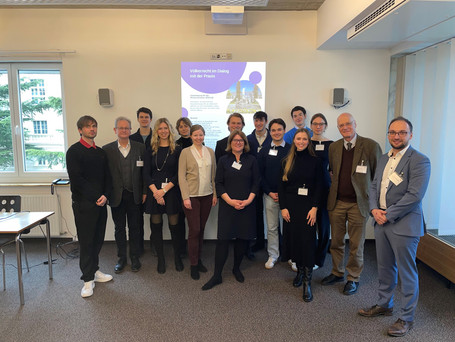
On Thursday, January 23, and Friday, January 24, 2025, the seminar "International Law in Dialogue with Practice" took place at the "At the Park Kurhotel" in Baden near Vienna. The seminar, funded by the Hanns-Martin Schleyer Foundation, focused on the theme "The Autocratic Challenges to International Law," aiming to foster dialogue between legal practitioners and Master's and PhD students interested in international law.
To enrich the discussions, two experienced experts were invited: Ambassador Professor Dr. Helmut Tichy, former head of the International Law Department at the Austrian Ministry of Foreign Affairs, and Dr. Schnutz Dürr, Head of Program Planning at the Council of Europe. They engaged in discussions with the participants, offering them valuable insights into the realities of international law and diplomacy.
Over the course of the two days, the participants presented the topics of their seminar papers, with a particular focus on the challenges posed to international law by the rising power of autocratic states and the declining influence of the West. The seminar’s engaging format provided ample opportunities for participants to network and exchange ideas, particularly during shared dinners and other social events.
On 15.August 2024 Prof. Dr. Monika Polzin, LL.M.(NYU) published a guest article on the topic of the Autocratization of International Law in the NZZ.
The article can be found here
![[Translate to English:]](/fileadmin/wu/_processed_/5/2/csm_109-Laptop-960_v1_c3f280bec2.jpg)

![[Translate to English:] Bild 1](/fileadmin/wu/_processed_/6/d/csm_Engage2_c9917d18ab.jpg)
![[Translate to English:] Bild 1](/fileadmin/wu/_processed_/e/b/csm_Ges._Mag._Martin_Meisel_5f6a7c310c.jpeg)
![[Translate to English:] 1](/fileadmin/wu/_processed_/e/4/csm_IMG_6361_c31ccbe139.jpeg)
![[Translate to English:] Vortrag2025](/fileadmin/wu/_processed_/1/4/csm_IMG_6509_66cd93f5f9.jpeg)
![[Translate to English:] Logo im Quadratformat von der Stiftung](/fileadmin/wu/_processed_/2/5/csm_Logo_Hanns_Marting_Schleyer_Stiftung_2_94aba1ee96.png)
![[Translate to English:] Ginsburg 7t68x480](/fileadmin/wu/_processed_/3/6/csm_Foto_Ginsburg_768x480_33f0d80cd9.jpg)
![[Translate to English:] 1](/fileadmin/wu/_processed_/f/8/csm_BOAnet_Audimax_innen_2e468d5e46.jpg)